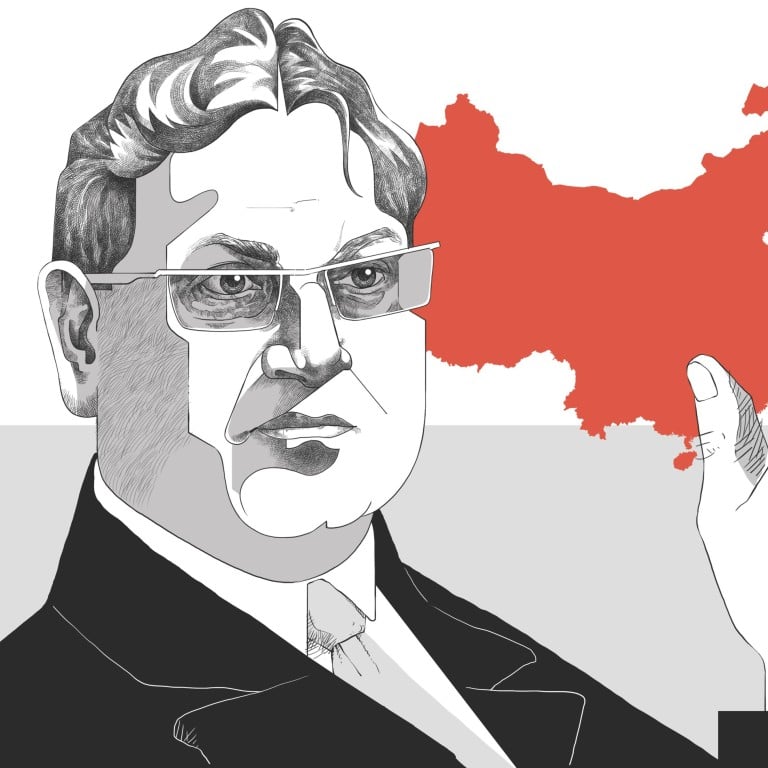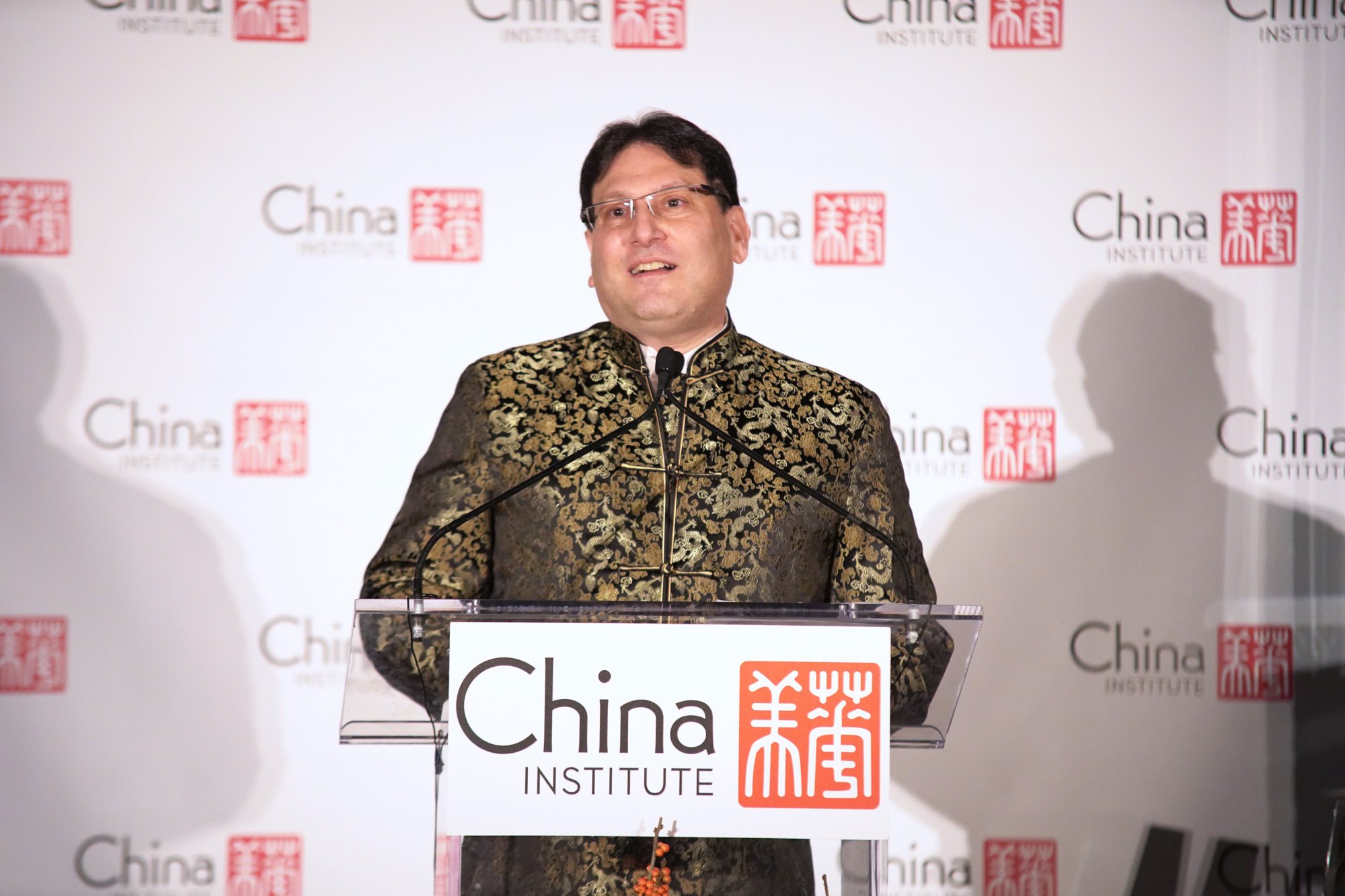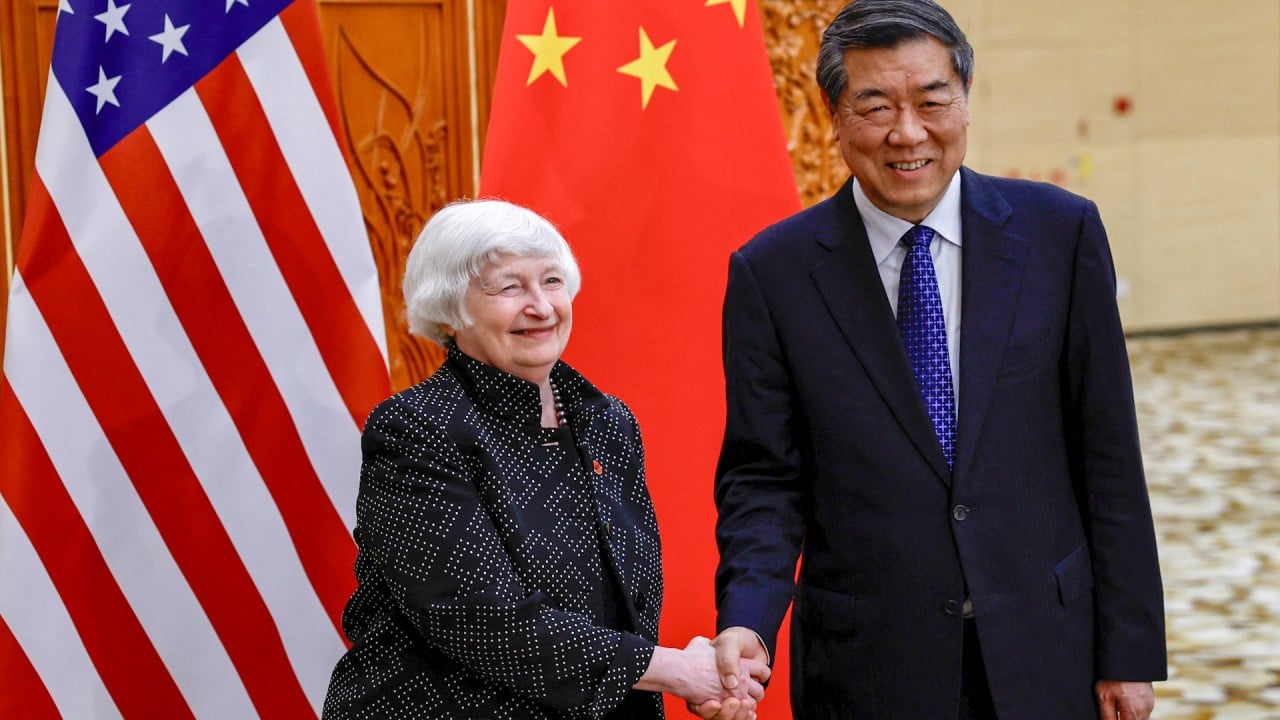
Open questions | ‘Parallel universes’: PR expert James Heimowitz finds hope for future US-China relations away from politics
- Veteran China watcher says revived people-to-people exchanges are key to more stable US-China relationship
- Heimowitz gauges potential impacts of US presidential election, missed opportunities, the role of ‘truly unique’ Hong Kong, and ‘saddest stories’
You came to China over 40 years ago as one of the earliest American students to the country after its opening up. What do you like the most about China and what frustrates you the most?
When I first went to China, I felt like an astronaut landing from outer space onto a foreign planet.
If you asked me this question in 2018 or 2019, I would say, the biggest thing that struck me is how modern, how cosmopolitan, how international, how global China had become. And it felt comfortable to be a global citizen in most of China.
But in the past five years, I feel things are changing. As China advances, in some ways, it seems to be doing so in parallel to the rest of the world – not in sync with it.
If you think about WeChat for example, it’s its own ecosystem, and it is purely domestic in China. Chinese digital payment systems are evolving, but they do not talk to the payment systems in the international arena. The pop culture trends and fads that are emerging have less and less connectivity to what’s popular in the rest of the region and world.
At the same time, I suppose it is emblematic of how many places on the planet are evolving to become more inward looking, and less engaged with the rest of the world.
I find this very worrisome, because the fewer shared experiences we have, the easier it becomes for misunderstandings and mistrust to develop.
You asked me what I liked. One thing I have always loved about China, especially during the times that I lived there in the ’80s, the 2000s, and the 2010s, was China’s dynamism, it was on the go, it was moving, it was growing, it was embracing modernity while acknowledging and respecting tradition – but it never felt trapped by tradition.
You mentioned that a lot of countries are increasingly looking inward rather than outwards. So is that the same case for China?
The short answer is yes, it is the same.
You are a seasoned expert on public relations, you also were responsible for international media relations for the 2008 Beijing Olympic Games. Various surveys have shown increasingly negative views of China among other countries, including the United States. How do you read this situation? Does China have a messaging problem?
By and large, when the [Communist Party] communicates to the people of China, it does a brilliant job.
They have crafted an emotionally driven and successful narrative that is continuously evolving and resonates deeply and broadly across much of China.
But when they try to leave and go outside China, it becomes much more challenging. We see how Hong Kong and China have struggled – and continue to struggle – and Hong Kong is already a place that is much more familiar with mainland China than the rest of the world.
I think that, in some respects, China’s learning and trying. But it’s still struggling to understand how the other side wants to receive things.
I would argue, it is happening in reverse too. Until recently, Chinese people were more amenable to hearing what Western news sources and Western media were saying, but increasingly, Chinese people across all spectrums of society tell me that the American or Western media is just interested in attacking China. So it is actually both sides that are not listening.
And again, I would say this is emblematic of how China mirrors global trends.
Inside the United States, I would argue that the people that listen to conservative news media, live in an information chamber, and very, very few of them will be open to or willing to listen to, or trust other sources that are viewed as liberal. The reverse is true as well. So this is not a problem unique to China.
Do you have any advice for China on improving its image in the West and other parts of the world?
My prescription for improvement is based on improving trust.
As you build and foster trust, you begin to take more risks. And as you take more risks, hopefully, you get rewarded.
If we look back to the 2008 Olympic Games – which I think about as a ‘golden time’ for China communicating, in a much better way, with the West, my advice was, the more trust you demonstrate, and the more freedom you give to international media, the better the results will be.

Westerners, particularly journalists, chafe at being directed as closely as Beijing is used to doing.
I did not expect them to open up the floodgates, that is just not in their DNA, but they did take some baby steps, and I think they were pleasantly surprised with the outcomes.
This is, by the way, something that I think about beyond journalism. When people visit China and experience it for themselves, they usually come back with a much richer and positive narrative than what they expected to have.
China has rolled out a series of measures in recent months to attract more overseas tourists and investors. How do you view Beijing’s efforts? Are they enough to convince more foreign visitors to go to the country? What implications might they have for China’s global image?
You ask a really important question. I think we’re taking really, really important steps here.
When I experienced China first opening up in the 1980s and ’90s, government was not in the lead.
At that time, it was Western businesses who were seeking greater access to the markets of China. They forged the way, and then government regulations and policy began to follow based on the private sector first taking the lead.
I personally believe that at this time, we’re going to need to look to non-governmental interlocutors, like culture, arts, education, sports, and theatre to get people to feel a bit more comfortable with each other again, to rebuild the trust, which I think has evaporated over the past five years.
You asked if those measures are gonna work, well, we absolutely have to try. And I’ve already seen that it is beginning to work. Since Presidents Xi [Jinping] and [Joe] Biden met in San Francisco for Apec, we can already feel the difference as more flights start to come back and more students, tourists and businessmen begin to re-engage.
Senior US official explains how China risks crossing ‘red line’ with Russia
We also need English media to have a much deeper, balanced and fact-based approach to China coverage. Whether we like it or not, China and America are in a relationship. Like any relationship, it goes through ups and downs. Since the pandemic it feels something like a bad marriage.
But I still think both sides are very committed to this relationship. As tough as things have been, I feel a strong desire for both sides to somehow work out a way to figure out a future for this relationship.
You have been studying Chinese since childhood. But the number of American students in China was just 700 last year, still far below the peak of about 15,000 six or seven years ago. Meanwhile, recent reports have shown that Chinese student preferences for education abroad is shifting away from the US. How do you view this?
The numbers are way too low. It’s a deeply worrisome trend to me.
This is the planet’s most important bilateral relationship. American kids need to acquire the skills, including language skills. That will enable them to engage with China in a meaningful way.
I think the good news is both sides have recognised this. I have spoken to US senators who are involved in international educational exchange, and was told they are actively reconsidering the resumption of programmes like Fulbright in China.
I was a Fulbright Fellow and I can tell you there’s no substitute for walking the streets, and hearing what people have to say or sitting down and having a meal with new friends.
At the same time, the number of Chinese students studying in the US is dwindling. Something is in there that is making it less attractive. The US side needs to seriously reassess why it has become so anxious about Chinese students studying in the US and the toll it is taking on how China perceives America.
I listen to President Xi talk about a commitment to welcome 50,000 American students to study over the next five years, but we’ve got a challenge and a problem.
Do you think there are 50,000 students jumping up and raising their hands wanting to come to China? At the moment, there are a lot of negative feelings toward China in the US.
A lot of that is, frankly, based on misinformation, but it is very much the reality of the situation.
Do you expect China can achieve that 50,000 goal?
I’m actually very optimistic. There are obstacles, [but] I’m far more optimistic today than I was six or eight months ago. At least now there is a framework in place to move forward. Whether we hit 50,000 or not, well that remains to be seen.
How do you view the current state of US-China relations?
The nature of the relationship also is dependent on the structure and power dynamics of the relationship.
Twenty years ago, the US was in the dominant position. It was richer, more influential and more powerful.
Over the past two decades, China has truly emerged. China has become richer, more modern, more powerful and more influential creating structural tension between the world’s two most important powers.
No matter how you look at it, this is going to cause anxiety and stress on the relationship.
Now the question is, what do you do about that? And how do the two sides manage that stress? That is not going to be so easy, because some of those structural realities won’t change.
Many policymakers and people in America are deeply suspicious of the intentions of China as a nation. And as they lose their ability to have the dominant position in the relationship, they only become more anxious.
China is going to be out there looking after its own best interests. That is what a nation state is supposed to do for its citizens. But I would argue it is in the best interests of China to also maintain a healthier relationship with the other major power on the planet.
Do you perceive the same tensions at the people-to-people level?
I think this is a huge area of risk. I think the only way things are going to get better is through increased interconnectivity. We’ve lost a lot of shared experiences and cross-cultural admiration. We’ve grown apart in the way we exist. This does not mean you need to give up your cultural uniqueness or cede national security concerns, but the key to achieving a more stable and hopeful future starts at the people-to-people level.
I believe that Americans need to embrace training the next generation of Americans and give them the Chinese language skills they will need to properly engage with China.
Confucius Institutes tried to help Americans with these skills – enabling more direct access to China at a primary level. At its peak, a vast network of Institutes operated across America, including in remote locations that had little or no resources to offer Chinese language learning to local students.
I mean if you are studying at an Ivy League school, or a top private school in New York City or Los Angeles or Chicago, you have access, but if you look at the American heartland, or in less privileged communities where school boards are forced to choose between say art and music, it’s a very different story.
Certainly, I understand that language dominance can be seen as a type of soft power, and certainly I understand that Washington has legitimate concerns about some of the policies and actions taken in Beijing, but the anger hurled at Confucius Institutes was misplaced anger.
For many people, it was inconceivable that the Chinese government could do anything good. The institutes were somehow seen as a kind of “Trojan horse” infiltrating campuses in the US, and the result was that Confucius Institutes were weaponised and demonised.
In my view this was really a missed opportunity, because if communications were better and there was greater transparency on the Chinese side and greater comfort on the American side to approach and have open and honest, frank discussions and address the issues and concerns, Confucius Institutes could have been a success story rather than the failure that they turned into in the US.
After all, how different are Confucius Institutes from the Alliance Française or British Council or Goethe Institute? All of them receive substantial support from their respective governments. They are all vehicles to promote culture, language and image. And if we look at their activities and programmes in a very granular way, I think we will find they are fundamentally more similar than dissimilar.
Yes, the Chinese style is quite different from the Western European approach, but perhaps the biggest difference is less about what CI’s did and more about the deep-rooted, very palpable discomfort with the Chinese government as a source of support.
To fix US-China relations, we must centre the lives of ordinary people
The tragedy of Confucius Institutes is emblematic of a dysfunctional relationship. We are not going to see underlying tensions and anxieties magically melt away, but hopefully, as we begin to have more exchanges and more contact points, there will be a little bit more room for people to have a comfort level that allows them to move forward in a more productive way.
Can we expect the people-to-people exchanges to drive the official relations between Washington and Beijing in the future?
I think we can.
I’m hopeful that this exercise in allowing cultural breathing space may move to be nourishing for the relationship. And I believe it can be.
Perhaps if government is a little bit less directive about these things, and we allow things to really happen at people-to-people levels instead of a government-directed people-to-people level.
What potential impact do you expect from different outcomes of the US presidential elections on the US-China relationship? What concerns you most?
I think that most people in America are still deeply anxious about the rise of China, and what that means for Western values.
I think America is suspicious and nervous that Chinese values are somehow different. So it’s going to be troubled, no matter what. The Biden administration sees itself in a troubled relationship with China but it still sees itself in a relationship. If there were another Trump administration, I worry that unforeseen events might lead a divorce.
The only way to reduce those anxiety levels is by increasing the touch points. The more touch points you have, the more empathy and appreciation there is for other value systems.
You lived and worked in Hong Kong for a long time. What are your thoughts on Hong Kong’s current situation and its role, particularly after the new national security law?
Hong Kong is a very special part of China, it is truly unique.
I would say, both Hong Kong and [mainland] China will be far better off in doing more to preserve the unique nature and characteristics of Hong Kong that make it so special.
It is very different. Its history and its heritage and its role in finance, in being an intermediary between China and the rest of the world is truly unique.
If Hong Kong just becomes like any other prosperous city in mainland China, then I think both Hong Kong and China will have lost something very special.
When the Hong Kong people went through all the times of unrest in 2019, they lost sight of being one country.
At the same time, I think that the Hong Kong government may not have done enough to impress upon Beijing the importance of two systems.
The way forward is to modulate pendulum swings and give the very novel concept of one country, two systems a chance to function and evolve.
Is there still room for Hong Kong to do so?
Yes, but I think it’s suffered erosion in the perception of many Western countries. It is going to take time to rebuild trust.









